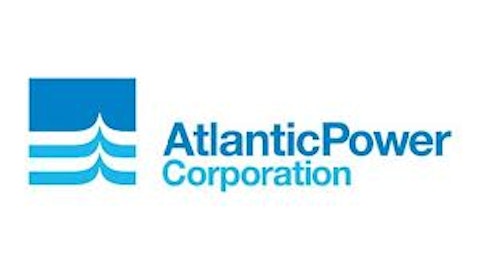
“Accretive acquisitions”
Straight from the horse’s mouth, Atlantic Power Corp (NYSE:AT) aims to “increase the value of the company through accretive acquisitions in North American markets while generating stable, contracted cash flows from our existing assets.”
Since the utility’s 2004 Canadian incorporation and 2010 NYSE IPO, Atlantic Power Corp (NYSE:AT) has been busy acquiring… and acquiring… and acquiring. Its current generation capacity clocks in at 2,117 MW, and the utility added 450 additional MW in 2012 alone.
Most recently, the company has ramped up its renewables investments. It purchased a 300 MW wind farm in early 2012, and acquired renewables company Ridgeline Energy last December to add another 150 net MW wind capacity. Atlantic Power Corp (NYSE:AT)also owns biomass projects in Georgia and NC, and Ridgeline’s project pipeline will put 600 more MW of wind and solar into its energy portfolio.
But accretive acquisitions aren’t always what they’re chalked up to be. The company shed a variety of projects in 2012, from $136 million of Florida power plants to an 84-mile transmission project (now majority-owned by Duke Energy Corp (NYSE:DUK) ).
Cold hard cash
To act on investment opportunities, Atlantic needs steady (and hefty) cash flow. Most utilities own regulated entities with fixed rates to stabilize profits, but Atlantic Power Corp (NYSE:AT) operates entirely in the competitive marketplace. To offset volatility, the utility relies on long-term purchasing power agreements, or PPAs, and hedged commodity pricing to keep consistency.
PPA’s are a sore spot for Atlantic, as they’re a key facet of a flurry of lawsuits aimed at punishing the company for alleged false and/or misleading statements concerning the future of soon-to-be-renewed contracts. Duke Energy Corp (NYSE:DUK)’s Progress Energy Florida didn’t select Atlantic as its power provider of choice, and TECO Energy, Inc. (NYSE:TE)‘s Tampa Electric recently decided to take power generation into its own hands with a new combined-cycle plant.
Hedging is common practice for any energy company, but Q1 earnings reports have already proven that this financial tactic can only absorb so much of increasingly volatile energy prices. Exelon Corporation (NYSE:EXC) took a one-time $235 million hit this quarter as a result of natural gas hedges gone wild, while PPL Corporation (NYSE:PPL)‘s bad bet helped knock around 20% off its first quarter EPS.
Looking ahead
They say the first step to recovery is admitting you’ve got a problem. Atlantic Power Corp (NYSE:AT) did just that during its Q4 earnings report, when it announced it would cut its highly unsustainable dividend by 66%. Shares plummeted, lawsuits poured in – is Atlantic finally ready to recover?
Moving forward, the utility will focus on natural gas and renewables. But with natural gas prices on the rise and PPA’s not panning out as expected, a bet on natural gas isn’t the bargain it was a year ago. With 58% capacity already coming from gas, any new investments will further reduce the company’s diversity.
Renewables might provide a bright spot in sales, but if Exelon Corporation (NYSE:EXC) and PPL Corporation (NYSE:PPL) are any indication, hedging could smudge out any earnings excitement.
Foolish bottom line
Atlantic Power Corp (NYSE:AT) shares are cheap and, under different circumstances, its strategy just might work. But “growth by acquisition” doesn’t jive with heavy debt, unsustainable sales, and a cash flow problem. Larger utilities will weather natural gas’ recent price spike, but it’s another nail in the coffin for Atlantic shares. The utility is trying to dig itself out of the undiversified ditch it’s found itself in, but I think it might just be too little, too late. Buyer beware.
The article Is It Time to Buy Atlantic Power? Part Three originally appeared on Fool.com.
Motley Fool contributor Justin Loiseau has no position in any stocks mentioned, but he does use electricity. You can follow him on Twitter, @TMFJLo, and on Motley Fool CAPS, @TMFJLo.The Motley Fool recommends Exelon.
Copyright © 1995 – 2013 The Motley Fool, LLC. All rights reserved. The Motley Fool has a disclosure policy.

